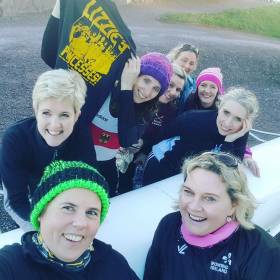Displaying items by tag: Heather Boyle
Cork and Shandon In Form at Muckross Head
#Rowing: Cork Boat Club’s intermediate eight proved the fastest crew at the Muckross Head of the River at the National Rowing Centre. Shandon, who had a set of good results, saw their eight finish just five seconds off that pace – and their junior 18 quadruple took just nine minutes and 48 seconds to cover the course, placing them seventh overall. Justin Ryan of Skibbereen was the fastest single sculler.
The adult women’s ranks were thinner in numbers. Monika Dukarska was the fastest single sculler. A masters women’s crew from Lady Elizabeth and Dublin University Ladies Boat Club won: it featured well-known names, including former internationals Vanessa Lawrenson and Heather Boyle.
Muckross Head of the River – Selected Results
Overall: 1 Cork BC intermediate eight 9 mins 20 sec, 2 Shandon inter eight 9:25, 3 UCC senior quadruple 9:35.
Men, Eight – Intermediate: Cork 9:20. Club One: UCC 9:35. Club Two: UCC 9:44. Jun 16: Fermoy 10:35. Masters: Castleconnell 13:25.
Four – Sen: Shandon 9:56. Inter, coxed: Skibbereen 10:36. Club One: UCC 10:33. Jun 18, coxed: Presentation Col (D Murphy) 11:07
Pair – Sen: Skibbereen 10:54. Jun 18: Shandon 10:55.
Sculling, Quadruple – Sen: UCC 9:35. Club One, coxed: UCC 13:05. Club Two, coxed: Workmen’s 11:05. Masters, coxed: Clonmel 13:26. Jun 18: Shandon 9:48. Jun 16, coxed: Lee 10:56.
Double – Sen: UCC 11:33. Inter: UCC 10:37. Club One: Shandon 11:09. Jun 18: Skibbereen 11:11. Jun 16: Shandon 11:28.
Single – Sen: Skibbereen (J Ryan) 11:26. Inter: Castleconnell (P Silke) 12:00. Club One: Castleconnell 12:15. Club Two: Cork (R Povey) 12:16. Jun 18: Shandon (E Gaffney) 11:39. Jun 16: Tralee (B Winde) 12:57. Masters (H, adjusted): Lee Valley 13:40 (11:36).
Women,
Eight – Club One: Lee Valley 13:08. Club Two: Shandon 11:12. Jun 16: Muckross 12:28. Masters: Lady Elizabeth, Trinity 12:35.
Four – Sen: Skibbereen 11:36. Inter, coxed: Skibbereen 12:53. Club Two, coxed: Cork 12:22.
Pair – Sen: UCC/Skib 11:58.
Sculling, Quadruple - Sen: Workmen’s 10:50. Club One, coxed: Fermoy 12:14. Club Two, coxed: Lee 12:35. Jun 18: Workmen’s 11:12. Jun 16, coxed: Lee 12:29.
Double – Sen: Cork 11:41. Club One: Workmen’s 12:00. Jun 18: Workmen’s 11:49. Jun 16: Killorglin 12:19.
Single – Sen: Killorglin (M Dukarska) 11:54. Inter: Skibbereen (L Heaphy) 13:09. Club One: Lee Valley 13:08. Club Two: Killorglin (E O’Donovan) 13:35. Jun 18: Kenmare (E Crowley) 13:19. Jun 16: Killorglin (R O’Donoghue) 13:19. Masters: Clonmel (F, adjusted) 14:54 (13:26)





























































